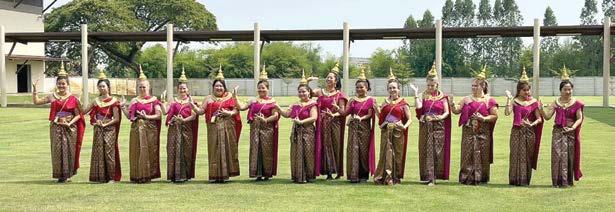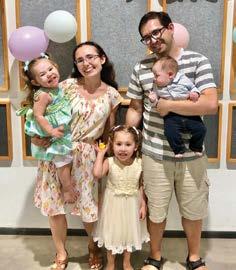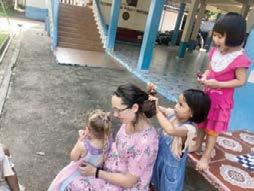
5 minute read
The Sound of the Gospel: When Missionaries Speak
by Jacob Clagg, CGGC Director of Communications
Bryan and Katie Crabtree, our missionary couple in Thailand, returned to the USA this summer to visit family, and to tell their story at churches in the Great Lakes and Midwest Regional Conferences. While undoubtedly the greatest benefit for the Crabtrees coming back to the USA is to see their families, to reconnect with friends and acquaintances, and to retread nostalgic places that ground them, there is a different benefit for us. When missionaries visit, they bring with them the opportunity to experience the people and culture that are, in this case, on the opposite side of the planet, and to provoke a renewed passion for the Gospel.

With all three children in tow, Bryan and Katie presented a tremendous amount of material to the churches they visited, speaking candidly about the joys and struggles of living, working, and raising a family in Thailand. The Crabtrees live in the Issan region of Thailand. Situated in the Northeast part of the country, the Issan region is the poorest region, mostly comprised of agriculture and farmland. Less than 1 in 1,000 people in this part of Thailand considered themselves to be Christian. Taking a macro perspective, this region is representative of the larger “10/40 window,” a missionary term that designates a cross section of Africa, India, and Southeast Asia where approximately 25% of the global population lives, but where the vast, vast majority have never heard of Jesus Christ, and where, according the Crabtrees, only about 1% of missionaries go.
It is no small privilege to listen and learn from this 1%. In listening to missionaries like Bryan and Katie speak of their effort in a foreign land, our minds are called to reconsider our own lives and the comforts therein. We are forced to reckon with our blessed predisposition, and the uniqueness of our affordances which allow us to, at times, take God and Church for granted. In this heavily underevangelized region, the Crabtrees can expect to receive heavy cultural resistance to Christianity, where other religions like Buddhism and Islam are deeply entrenched and culturally rooted.
The Crabtrees spoke about how the church they attend has seen over 40 baptisms in the past year. That would be an incredible number for any of our churches, but it’s a genuine miracle considering how challenging it is for Thai people to leave the Buddhist faith and to officially convert to Christianity. Baptism is the final demarcating line for Thai people. Once you’re baptized, the old life falls away, and in Thailand, that can come with some extreme disruption for people who are often ostracized from their families, friend circles, and perhaps their entire culture.
As the Crabtrees have said before, to be Thai is to be Buddhist, and so there are many reasons why a Thai person might consider themselves Christian yet struggle to take the final step toward baptism. When listening to Bryan and Katie talk about how difficult it is for Thai people to convert to Christianity, we ought to find ourselves both grateful for our religious freedoms, and humbled by professions of faith that we know would challenge us to our core.
Of course, it’s not just the spiritual battles that move us when we have the opportunity to hear from missionaries, but it’s the little things to. We can hardly imagine the sights, sounds, and smells. We bend our minds to comprehend the unyielding heat and stifling humidity during the hot seasons. We shake our heads in disbelief at the annual rains that flood streets and homes. And we shiver at the pictures of tree frogs jumping, wild cobras spitting, geckos crawling, and venomous centipedes scurrying.
One of the most moving parts of their presentation was when the Crabtrees spoke about Sarnelli House, a series of orphanages and homes for boys, girls, and small children who are abandoned by their parents because of severe disabilities or poverty. Currently, Sarnelli House has about 150 kids under their care divided into 7 houses based on age and gender (with the exception of the babies/toddlers) with 11-27 kids at each house. In one visit to the small children’s orphanage, the Crabtrees held and played with babies that rarely get much physical attention, and have little hope for adoption. In Thailand, there is almost no government assistance for homeless kids.


By the end of a missionary presentation, if we’ve been paying attention, we are refreshed. The crystal clarity of the mission and vision alights our darkened eyes. Like ice cold water on a hot day, we’re reminded of just how refreshing the Gospel and the Great Commission are when they are carried out. They ought not be bogged down by eldership squabbles over the color of the carpets, or over the right advertising strategy, or about moving the Bible study from 9 a.m. to 9:30 a.m. No, the opportunity to hear from missionaries reawakens dulled senses to the severity of the gospel reaching the far corners of the earth. The sound of the Gospel marching toward the orphan, the widow, the stranger, and the lost rings so true in our ears that we wonder why we’ve been listening to anything else at all.










